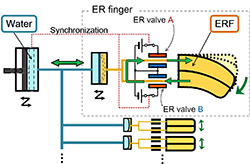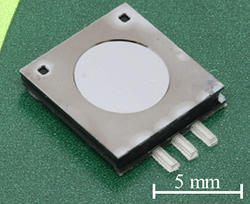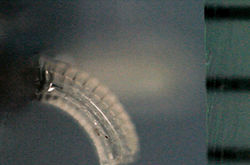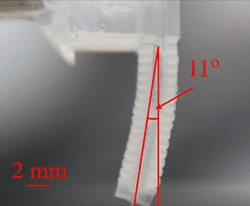Multi-DOF ER microactuator system using alternating pressure source
A novel multi-DOF ER microactuator system using an alternating pressure source has been proposed and developed. A microrobot has many microactuators for traveling, steering, handling objects, etc., and each ER microactuator needs two pipes for supply and drain, which results in a problem of large piping space. The proposed system drives each ER microactuator by rectifying alternating flow supplied by only one pipe using synchronized ER microvalves.
 |
 |
| Multi-DOF ER microfinger system using alternating pressure source |
Overview of fabricated ER microfingers43) |
|
| |
 |
 |
| Fabricated 1.6mm-long ER microfinger using MEMS technologies43) |
Fabrcated ER microfinger with CP-FERVs using MEMS technologies58) |
|
References
- 62: Thapanun Sudhawiyangkul, Kazuhiro Yoshida, Sang In Eom, and Joon-wan Kim: A multi-DOF soft microactuator integrated with flexible electro-rheological microvalves using an alternating pressure source, Smart Materials and Structures, Vol. 30, 085006 (14pp) (2021)
- 59: Thapanun Sudhawiyangkul, Kazuhiro Yoshida, Sang In Eom, Joon-wan Kim: A novel bending microactuator with integrated flexible electrorheological microvalves using an alternating pressure source for multi-actuator systems, Microsystem Technologies, Vol. 26, pp. 1507-1519 (2020) [Published online (2019)]
- 43: Tomoya Miyoshi, Kazuhiro Yoshida, Joon-wan Kim, Sang In Eom, Shinichi Yokota: An MEMS-based multiple electro-rheological bending actuator system with an alternating pressure source, Sensors and Actuators A, Vol. 245, pp. 68-75 (2016. 4)
- 41: Kazuhiro Yoshida, Satoshi Yamamoto, Sang In Eom and Shinichi Yokota: A Multiple-Microactuator System Using a High-Frequency Pressure Source, Sensors and Materials, Vol. 27, No, 4, pp. 317-328 (2015.5)
- 40: Tomoya Miyoshi, Kazuhiro Yoshida, Sang In Eom and Shinichi Yokota: Proposal of a multiple ER microactuator system using an alternating pressure source, Sensors and Actuators A, Vol. 222, pp. 167-175 (2014.12)

